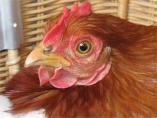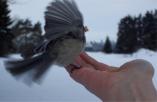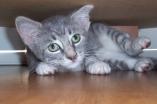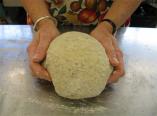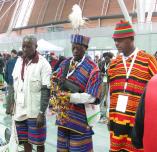Nearly a week has slid by since I waved goodbye to Seattle in the drizzly rain, my drizzly cold wreaking its final revenge as I worked my way through as many in-flight movies as I could en route to London last Sunday night. To clear the decks for reports from the UK, here’s a short and inadequate summary of the end of my AWP.
The last day of the conference was a bit up and down. I had been taking things easy, perhaps too easy — so missed the first session entirely and arrived late to the second – which I left in any case as it was just not what I wanted to hear. And the presenters were following the maddening habit of refusing to stand at the podium, rendering them invisible to all but those in the front row. It’s always hard to pick panels that are what you expect, but this was the first I’d given up on.
However, the last session of the day was very much what I’d been looking for: Phillip Lopate again, and this time in good form on “Lightening Up the Dark: The Role of Humor in Memoir”. He was entertaining and erudite, quoting from Max Beerbohm here and Charles Lamb there, and in good pedagogical form about the many types of humour (dictional, mock pedantry, self deprecation and more). He read a bit from his own writings before Joe Mackall took his place on the podium, quipping that following Lopate was like being Danny DeVito accompanying Brad Pitt to a singles bar: “they’re not there for you but there’s decent overflow.” Mimi Schwartz brought the house down with an account of her husband’s leavening wit when helping her look for her mislaid breast prosthesis by calling “here titty titty.” And Suzanne Greenberg gave wry insights into how she guides students into using humour to personalize their first person writing, and the power of the “laughter of the truth revealed.”
It was a pretty good panel, though one of the panelists should really have presented his piece instead at the session I’d attended earlier, “Telling it All: Boundaries in Creative Nonfiction” in which the panelists each read pieces they felt crossed a line of some kind, and then talked about what they would and would not say in a piece of writing. It really comes down to your willingness to define and defend what is your story, it seems. One of the panelists maintained that his story had to be told regardless of how the other characters might be revealed in it; others felt a measure of queasiness at shedding poor light on parents and friends, or unfolding uncomfortable details. Emily Fox Gordon observed she’s made a kind of fetish out of being self-savaging – perhaps to show others she’s as hard on herself as they may feel she is on the people she writes about. Ann McCutcheon insists the question “whose story is it” must be respected, but warns that readers may feel that the memoir is the whole and only truth of a story.
And that was about all I could manage to take in for that day.
The very promising evening reading by Sharon Olds and Jane Hirschfield was, by all reports, a stunningly moving event, but I was too tired and sniffly to make it. And I have heard both before so missing it was relatively less irksome. I may have used up the last of my resources in a belated final sweep of the book fair – a boggling affair featuring thousands of exhibitors, most packing up or gone by then. Ah well, I had determined not to weigh my bags down for the onward travels, so just as well. And after a delightful supper (water buffalo burger?!) with a gang of writers, opted to return to the flat and pack up ready for the morrow’s journey.


